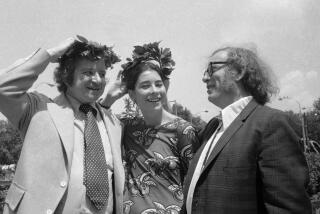From McMurtry, a multilayered saga
LATE middle age is suffused with ambiguous mercies. One gradually loses, for example, the ability to distinguish between resignation and happiness. At the end of the day, though, what’s gained and lost needs to add up to something, because age without wisdom is a sad thing and about as close as you get to a wasted life.
At nearly 71, Larry McMurtry, the Texas-born man of letters, has written, among many things, a Pulitzer Prize-winning novel (“Lonesome Dove”) and an Academy Award-winning screenplay (“Brokeback Mountain”). “When the Light Goes” is his 30th book and extends into a fourth volume his chronicle of the fictional Thalia, a dusty and forsaken oil patch town that bears more than a passing resemblance to Archer, Texas, where the author grew up. The first volume in the series, “The Last Picture Show,” came out in 1966 and received a classic screen adaptation from Peter Bogdanovich. McMurtry carried the story of one of that book’s protagonists, Duane Moore, into the novels “Texasville” (1987) and “Duane’s Depressed” (1999).
McMurtry, who used to go around in a T-shirt emblazoned with the words “minor regional novelist,” is not only a writer but also a formidable bibliophile and bookseller, and in his writing he has a bookish individual’s fondness for the multilayered allusion. Thus, in Greek mythology, Thalia appeared in several guises, but first and foremost as the muse of comedy and idyllic -- which is to say, rustic -- poetry. Given the uses the author has made of his imagined Thalia, that’s all clear enough, but the name takes on added resonance when one recalls that the idyllic school of art and poetry ultimately came under intense criticism for stressing the picturesque idealization of rural life over its often brutal realities.
The title, too, is multilayered. “When the Light Goes” might simply refer to Duane’s fondness for dealing with life by staring into the sunset, or it might signal the autumnal mood of a protagonist now 64 and increasingly debilitated by three clogged arteries, the product of way too many butter-basted T-bones over at Pat’s Steakhouse in nearby Seymour. Or, it could refer to what sometimes occurs between two people when the lights go out -- and there’s a great deal of that in the second half of this novel, much of it rendered in a flatly clinical and rather coarse detail rather uncharacteristic of this author.
The story picks up a few weeks after the end of “Duane’s Depressed.” McMurtry’s faithful readers will recall that things had gone disappointing and wrong for the protagonist, whose moderately successful oil drilling business had made him Thalia’s richest man, owner of its largest house, husband to the shopaholic Karla, and a father and grandfather. Duane decides he hates the house, gives up his pickup truck for a bicycle and spends increasing amounts of time away from the office he loathes in a cabin Karla disdains as a hut. By the end of the book, one of Karla’s daylong shopping trips to Dallas has ended in a fatal car crash and Duane has thrown a few things in a knapsack and headed off to Cairo to see the pyramids.
On his return to Thalia at the opening of “When the Light Goes,” Duane can’t bear to enter the big house, not even to get a much-needed shower and shave. (The pyramids had turned out to be great, but Egypt was as dusty as West Texas.) So Duane seeks rest -- and something else -- from a series of local women: first from Ruth Popper, his oldest and a platonic friend, then from the psychiatrist Honor Carmichael, who temporarily throws over her lesbianism to console Duane. She also puts “a troubling notion in his mind: the notion that he was, emotionally, a closed door. She even suggested that he had never opened that door even for Karla, his wife. The implication was that he had never let anyone in. What did it even mean, letting someone in?”
Enter Annie Cameron, a geologist in her 20s employed by Duane’s oil-drilling company and the victim of a family curse that precludes any of the Cameron women from having orgasms. All this gets worked out -- after a fashion -- in a sequence that involves Viagra, one of those sex education videotapes and a bout of lovemaking that gives Annie her first taste of satisfaction and sends Duane off in an ambulance for triple bypass surgery.
In the poem he composed for John F. Kennedy’s inauguration, “The Gift Outright,” Robert Frost put the paradox of Duane Moore’s sort of American identity this way: “The land was ours before we were the land’s.” A few lines later, he went on:
Possessing what we still were unpossessed by,
Possessed by what we now no more possessed.
Something we were withholding made us weak
Until we found out that it was ourselves ...
At the end of “When the Light Goes,” Duane has found, if not love, then a companionable but sadness-tinged accommodation with Annie. Her parents have given them a hilltop home in Arizona as a wedding gift, and Duane recovers from his surgery with long walks in the desert and days spent sitting on the deck, staring off into Old Mexico; Annie makes millions trading futures on her home computer.
When she takes a business trip to a conference in Davos, Switzerland, Duane makes what could be a final pilgrimage back to Thalia. Boom and bust and a life that rode them up and down have come and gone. The town is once again in decline, and there are only the graves of his first wife and of his friends:
“When he looked back at Thalia, all he could see was dust -- it had been that way when he had been a teenager, coming in at dawn from a night roughnecking on some oil rig. Thalia was a place where the dust seldom entirely settled.”
There are, finally, tears -- and then, thoughts of Annie.
What does it all add up to?
On one level, it all makes for a pretty pat and rather too-cinematic ending. On the other hand, McMurtry, the novelist, has known Duane, the character, for more than 40 years, and he may just have too much respect for the guy to make him any wiser than he can be. Faithful readers of this writer, who has ended up as so much more than a “minor regional novelist,” might even recall one of the great lines from his 1963 book, “Leaving Cheyenne.” As one of the cowboys in that most underrated of McMurtry’s fictions put it:
“Nobody gets enough chances at the wild and sweet.”
More to Read
Start your day right
Sign up for Essential California for news, features and recommendations from the L.A. Times and beyond in your inbox six days a week.
You may occasionally receive promotional content from the Los Angeles Times.






